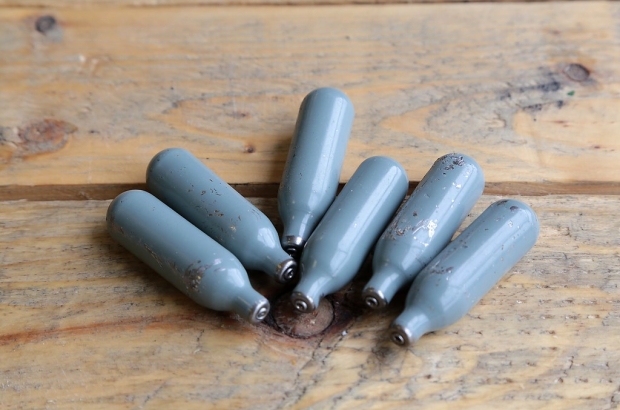- Daily & Weekly newsletters
- Buy & download The Bulletin
- Comment on our articles
Belgium cracks down on use of laughing gas
Nitrous oxide, commonly known as laughing gas, will be banned in Belgium following the adoption of a royal decree by Belgium's federal council of ministers.
Anyone who uses the substance or sells it will face fines or prison sentences - of up to five years if a gang is involved.
The text, which adds the gas to existing drug regulations, was supported by Belgium’s justice minister Paul Van Tigchelt, interior minister Annelies Verlinden, deputy prime minister Georges Gilkinet and health minister Frank Vandenbroucke.
The decree confirms that the possession, transport and sale of nitrous oxide, both online and physically, will be criminalised, unless intended for medical or technical purposes or as a food additive.
“The government has decided to insert nitrous oxide into the drug law,” said a spokesperson for Van Tigchelt. “Improper use will be prosecuted like cannabis.”
The decree is intended to prevent legislation being fragmented at a local level. It is up to the police or prosecutors to judge if possession or transport of the product is “abusive”, as the gas can still be used for medical reasons or in the food sector.
“We’re not targeting people who want to make a nice cream cake, or cyclists who carry small cartridges to inflate their bike tyres,” Van Tigchelt said.
“The people we are targeting are the young people caught at 2.00 in the morning in nightlife areas with large quantities of nitrous oxide. It would be difficult for them to claim that they wanted to bake a cake.”
The proposal was made as discarded canisters of nitrous oxide have become more common in Brussels in recent years - left in squares, parks or just on the side of the road.
Popular especially among young people, as a recreational drug, it is often taken via balloons causing an instant high. The effects do not last long, but regular users tend to increase the dose – and consequently the health risks – to get the same feeling.
With consumption on the increase for several years, the Portugal-based European Monitoring Centre for Drugs and Drug Addiction (EMCDDA) said it is “increasingly worried” about the steep hike in gas use.
Serious health consequences include hallucinations, seizures and even heart attacks.
A nitrous oxide is often taken before driving, inducing a similar effect to alcohol, but much faster, all other road users, in view of the potentially dangerous driving of the gas user, are affected.
As well as causing a general litter problem, the capsules and larger canisters storing the gas can explode if disposed of in incinerators. General recycling of the cans is not an option.
Many towns and cities already ban nitrous oxide. In 2021, Belgium passed a law making it illegal to sell the gas to under-18s, which came into force in February 2022.
But police and prosecutors, especially in the capital, which has seen the greatest increase, have called for stricter measures and bans.
A nationwide ban was proposed at a federal level last year, but the gas remained freely available, often in the form of whipped cream cartridges.
The Netherlands has already banned the intoxicant, in January last year. The UK followed suit in November.
Now, in Belgium, nitrous oxide will be classed, like cannabis, anabolic steroids and khat (a plant containing the alkaloid cathinone, a stimulant which causes greater sociability and mild euphoria), as a Class C drug.
This means that anyone continuing to try nitrous oxide for personal use will receive a fine of up to €200 if it is the first offence, increasing to €400 and €800 for second and third cases. Heavy fines and prison sentences await anyone dealing in or trafficking the drug.
This latest ruling follows increased demands from the police and the public for legal instruments to combat the use, transport and sale of nitrous oxide. Brussels mayors had also demanded sales to be restricted.




















Comments
At least they are not spending taxpayers' money to build them a 'safe area' to use the stuff.